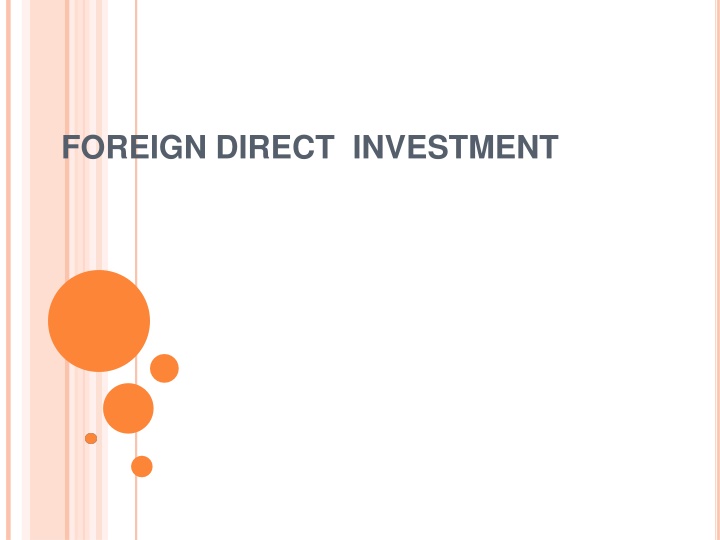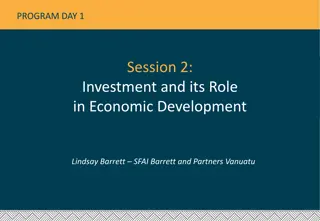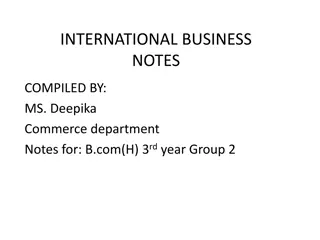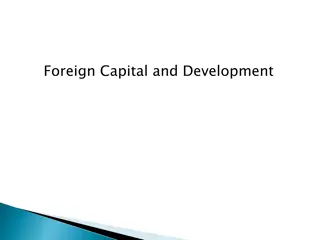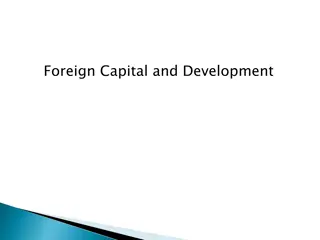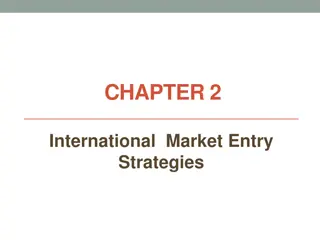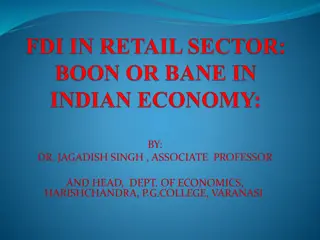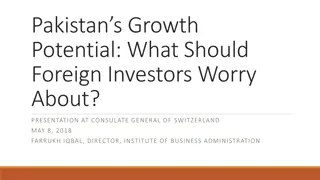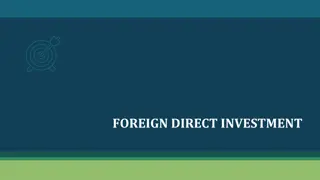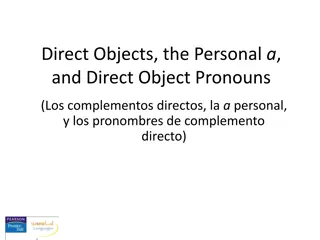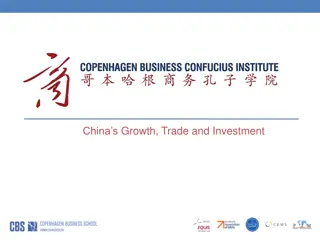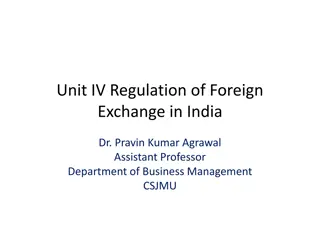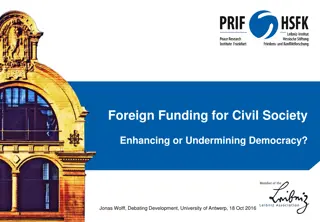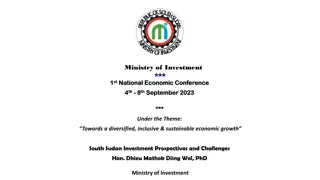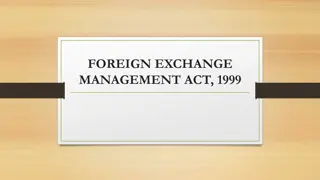Foreign Direct Investment: Key Insights
Foreign direct investment (FDI) involves an investor from one country investing in a business in another country, exerting control over the acquired company. This type of cross-border investment plays a crucial role in global economic activity and business expansion. Learn about the different types of FDI, including horizontal and vertical, motives behind FDI such as resource seeking and market seeking, as well as directions like inward and outward FDI. Understand the significance and impact of FDI on international business environments and economies.
Download Presentation

Please find below an Image/Link to download the presentation.
The content on the website is provided AS IS for your information and personal use only. It may not be sold, licensed, or shared on other websites without obtaining consent from the author.If you encounter any issues during the download, it is possible that the publisher has removed the file from their server.
You are allowed to download the files provided on this website for personal or commercial use, subject to the condition that they are used lawfully. All files are the property of their respective owners.
The content on the website is provided AS IS for your information and personal use only. It may not be sold, licensed, or shared on other websites without obtaining consent from the author.
E N D
Presentation Transcript
Disclaimer: The study material provided to our students of BBA of Department of Business Management is solely for the purpose of teaching and learning and has been obtained from varied sources. I do not claim for the originality of the content /resources/reading materials (PPTs, PDfs, You Tube Contents, Book Pdfs, Videos) shared as my own creation, as the contents/reading resources are a compilation from varied sources including open access sources and these are shared for the instructional and learning purpose by the students. I acknowledge and thankful to the sources, websites content writers and authors for their generosity in hosting their contents for wider dissemination and use. Dr. Rahil Yusuf Zai DoBM, IGNTU
WHAT IS FDI? Foreign direct investment is an investment in a business by an investor from anther country for which the foreign investor has control over the company purchased. It is also defined as cross border investment made by a resident in one economy in an enterprise in another company. FDI is direct investment into production in a country by a company located in another country ,either by buying a company in the target country or by expanding operations of an existing business in that country.
TYPES OF FDI BY BY MOTIVE DIRECTION BY ENTRY MODES BYTARGET
BY TARGET HORIZONTAL FDI :- Where the company carries out the same activities abroad as at home (for example toyota assembling cars in both japan and u.k) VERTICAL FDI:- When different storage of activities are added abroad . Where the FDI takes the firm nearer to the market is called Forward vertical FDI.(for example toyota acquiring a car distributorship in america) Where international integration moves back towards raw materials is called Backward vertical FDI.(for example toyota acquiring a tyre manufacturers)
BY MOTIVE Resource seeking:-looking for resources at a lower real cost. Market seeking:-secure market share and sales growth in target foregion market. Efficiency seeking:-seeks to establish efficient structure through useful factors ,cultures, policies or markets. Strategic asset seeking:-seeks to acquire assets in foreign farms that promote corporate long term objectives.
BY DIRECTION INWARD FDI:- An inward investment involves an foreign entity either investing in or purchasing the goods of a local company. OUTWARD FDI:- An outward investment is a business strategy where a domestic firm expands its operations to a foreign country either via acquisition or expansion of an existing foreign facility.
BY ENTRY MODES GREENFIELD INVESTMENT:- Greenfield investment is the investment in a manufacturing ,office,etc. It is the idea of building a facility on a green field such as farmland or a forest. MERGERS ANDACQUISITIONS:- A merger is a combination of two companies to form a new company, while an acquisition is the purchase of one company by another company in which a new company is formed.
BENEFITS OF FDI Improve foreign exchange position of the country. Employment generation and increase in production. Help in capital formation by bringing fresh capital. Helps in transfer of new technologies and management skill. Helps in increase exports. Increases tax revenues.
DISADVANTAGES OF FDI Domestic companies fear that they may lose theirownership. Small companies fear that they may not be able tocompete with world class large companies. Foreign companies invest more in machinery and intellectual property than in wages of the local people. Government has less control over the functioning of such companies as they usually work as wholly owned subsidiary of an overseas company.
FDI IN INDIA AND ITSROLE Foreign direct investment in India has played an important role in the development of the Indian economy.Fdi in India has in a lot of ways enabled India to achieve a certain degree of financial stability, growth and development. This money has allowed India to focus on the areas that needed a boost and economic attention , and address the various problems that continue to challenge the country.
PROCEDURE FOR RECEIVING FDI IN INDIA Automatic route:-Fdi is allowed under the automatic route without prior approval either of the Government or the Reserve bank of India in all activities/sectors as specified in the consolidated Fdi policy, issued by the government of India from time to time. Government route:- Fdi in activities not covered under the automatic route requires prior approval of the government which are considered by the foreign investment promotion board department of economic affairs ministry of finance.
